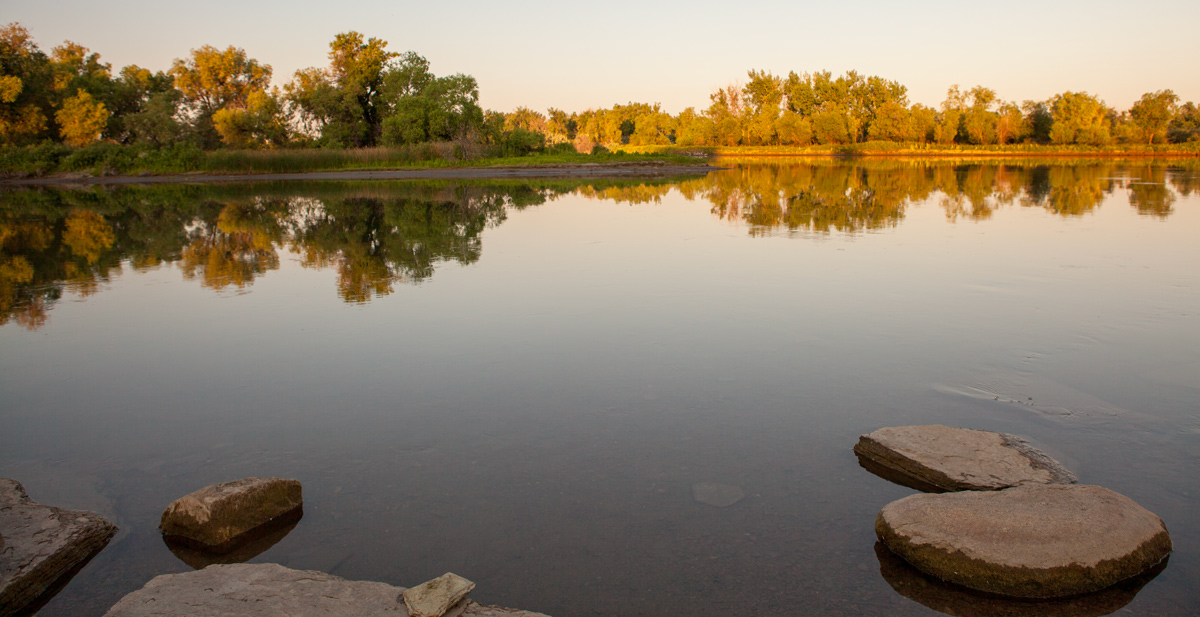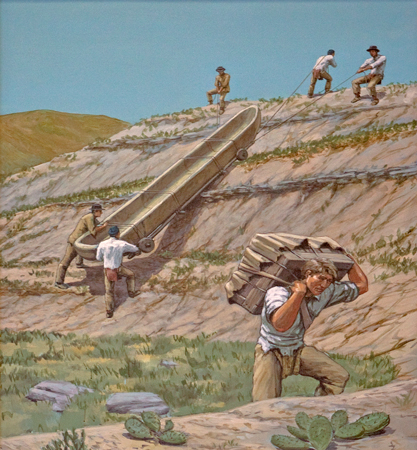At the White Bear Islands, Lewis establishes an area to assemble the iron-framed boat, and the dugout canoe abandoned on the portage route the previous night is brought in.
On the way back to the lower camp, Clark adjusts the route. Prickly pear troubles make walking difficult and the men suffer from fatigue.
Prickly Pear Troubles
by Yellowstone Public Radio[1]Originally aired weekdays by Yellowstone Public Radio during the Bicentennial observance of 2003-2006. Narrated by Hal Hansen. Scripts by Whit Hansen and Ed Jacobson. Produced by Leni Holliman. © … Continue reading
Sunrise at White Bear Islands
© 2 July 2013 by Kristopher K. Townsend. Permission to use granted under the Creative Commons Attribution-Share Alike 4.0 International license.
Early Morning Tasks
This morning early I scelected a place for the purpose of constructing my boat [iron-framed boat] near the water under some shady willows. Capt Clark had the Canoe and baggage brought up, after which we breakfasted
—Meriwether Lewis
The Portage Proceeds On
we proceeded on, & measured the Way which I Streightened considerably from that I went on yesterday, and arrived at our lower camp in Suffcent time to take up 2 Canoes on the top of the hill from the Creek
—William Clark
Prickly Pear Troubles
men mended their mockersons with double Soles to Save their feet from the prickley pear, (which abounds in the Praries,) and the hard ground which in Some & maney places So hard as to hurt the feet verry much
—William Clark
The Fatigues
the men has to haul with all their Strength wate & art, maney times every man all catching the grass & knobes & Stones with their hands to give them more force in drawing on the Canoes & Loads, and notwithstanding the Coolness of the air in high presperation and every halt, those not employed in reparing the Couse; are asleep in a moment, maney limping from the Soreness of their feet Some become fant for a fiew moments, but no man Complains all go Chearfully on—
—William Clark
Sun River Hunters
at length after ascending the river about five miles we found Shannon who had passed the Medecine river & fixed his camp on the Lard. side, where he had killed seven deer and several buffaloe and dryed about 600 lbs. of buffaloe meat
—Meriwether Lewis
Weather Diary
State of the thermometer at rise
Weather Wind at rise
State of the thermometer at 4 OC. P.M. Weather Wind at 4 OC. P. M. State of river 48 [above 0] fair S. E. 65 [above 0] cloudy S. E fallen ¼ in. —Meriwether Lewis[2]To assist the reader, the editor of this web page has omitted the date column, merged the “State of the river” columns, and spelled out some abbreviations.
Experience the Lewis and Clark Trail
The Lewis and Clark Trail Experience—our sister site at lewisandclark.travel—connects the world to people and places on the Lewis and Clark Trail.
Plan a trip related to June 23, 1805:

The Great Falls Portage is a High Potential Historic Site along the Lewis and Clark National Historic Trail managed by the U.S. National Park Service. It includes Sulphur Springs (open to the public) and Lower Portage Camp site (private land), and the Upper Portage Camp Overlook.
Notes
| ↑1 | Originally aired weekdays by Yellowstone Public Radio during the Bicentennial observance of 2003-2006. Narrated by Hal Hansen. Scripts by Whit Hansen and Ed Jacobson. Produced by Leni Holliman. © 2003 by Yellowstone Public Radio. |
|---|---|
| ↑2 | To assist the reader, the editor of this web page has omitted the date column, merged the “State of the river” columns, and spelled out some abbreviations. |




